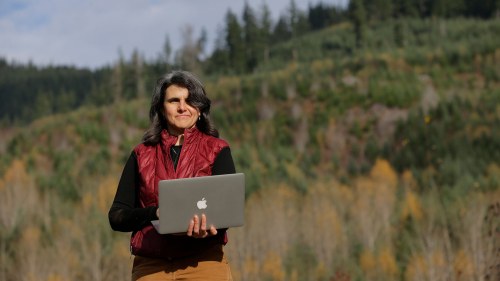A New Goal for Agricultural AI: Gender Mainstreaming

The inclusion of gender mainstreaming in agricultural AI can help reduce gender inequity for female smallholder farmers.
The agriculture and food sectors are looking towards a future where artificial intelligence (AI) is fully integrated into agri-food supply chains. Agricultural AI stands as a hopeful solution to concerns over diminishing farm yields as extreme climate events grow more frequent. Still, many people are concerned AI may only widen current gender inequities because of access barriers created by female smallholders’ lower rates of land ownership and literacy levels. Gender mainstreaming offers a framework for future gender-responsive AI solutions to ensure agricultural AI is truly accessible.
A Perfect Pairing? AI and Agriculture
AI has taken off in many industries, becoming a somewhat murky buzz word. While AI takes many forms, it is generally considered any technology that mirrors “human intelligence, specifically cognition and logic.” Scholars separate agricultural AI into two categories: AI robots and AI software. The former includes technology that can assist with physical tasks like harvesting crops, fertilizing with drones, and driving tractors. The latter is in newer stages of development and offers more complex services, like suggestions for crop cultivation, or even policy recommendations through ChatGPT.
On initial assessment, AI appears as a shiny new farming innovation, but as with most new technologies, concerns follow close behind. Scholars and farmers continue to focus on open data initiatives as the capabilities of agricultural AI strengthen. To make AI more accessible to a smallholder farmer, cost-free and barrier-free access is essential. The Open Data Charter dictates the public can consume data “at no direct cost,” but many skeptics of agricultural AI criticize that the technology falls short of this requirement.
The lack of physical inputs and land rights available to female farmers have exacerbated barriers for accessing resources. Female smallholders have less access to their family’s finances to purchase AI innovations, which is only compounded by the fact that when women do sell their own crops, they receive lower prices than their male counterparts for the same goods. Male farmers have a greater ability to incorporate AI technologies because of their higher incomes, and consistently, AI creators collaborate with male farmers over female farmers in the curation of AI. Cultural and gender norms that lead to women’s lower economic status illustrate the importance of creating gender-sensitive agricultural solutions.
At the end of the twentieth century, the United Nations (UN) adopted gender mainstreaming. The UN’s definition requires the consideration of both women and men’s experiences in the “design, implementation, monitoring and evaluation of policies and programmes” to eliminate all future gender inequality. Gender mainstreaming agricultural AI would ensure that female smallholders experience the comprehensive benefits of AI despite cultural norms and gender roles that have widened access barriers.
Colonization and Commercialization: The Criticisms of AI
Critics of agricultural AI highlight the tension between the epistemic values—or the scientific, and often Western, systems of knowledge used to program AI—and smallholder farmers’ contextual values. Naturally, AI reflects the cultural norms and values of the creator, promoting Western values through the guise of an objective global technology and simultaneously putting female farmers at risk of exploitation.
Historically, agricultural knowledge often sources from Indigenous communities and women. AI lacks the inclusion of this culturally sensitive and location-specific farming knowledge. For African smallholders, scholars label the absence of culturally sensitive programming as ahistoricism because of its inherent disregard for major historical phenomena like colonialism.
Women’s ownership of local agricultural knowledge necessitates gender mainstreaming and culturally sensitive protection measures within AI development. A solution lies, in part, with the inclusion of female farmers in AI curation; however, women and Indigenous farmers’ ownership of localized land, plant, and animal knowledge makes these subpopulations most at risk for having their knowledge abused for commercialization purposes. The commercialization of cultural knowledge subsequently raises questions of data sovereignty and intellectual property (IP) rights.
IP laws traditionally protect ownership of an idea or concept, but the intended application of IP laws does not perfectly align with the use of traditional knowledge in new technologies. Consistently, private companies have taken advantage of traditional knowledge, reasoning it belongs under the umbrella of “public domain.”1 Indeed, supporters of agricultural AI hope to make AI and public domain synonymous.
Public Good, Productivity, and Promises: The Pros of AI
Data scientists and farmers alike have pushed back on criticisms of agricultural AI and argue that the technology’s precise measurements will raise productivity, increase crop health, and reduce waste created in the process—mitigating climate change effects. They also point to the potential gendered benefits of AI, specifically through gender mainstreaming.
As AI becomes more widely used, it will likely prove more effective: AI sources from aggregate data, so the more frequently AI is used, the more data the technology can source from to improve its accuracy. Some chatbots are even using aggregate data to offer agricultural policy solutions. Chatbot programs, like ChatGPT, are often criticized for predominately citing Western sources, but the CGIAR Research Initiatives on National Policies and Strategies and Digital Innovation is developing an AI chatbot that will incorporate cultural knowledge specific to Kenya. This provides hope that AI will start to move away from its Western-centric information stream, and instead prioritize more culturally relevant solutions.
The African Union Panel on Innovation and Emerging Technologies argues agricultural AI could also help close gender inequity gaps in agriculture. The panel points to the UN Women’s Buy from Women platform that connects female farmers through online markets. Thanks to AI, female farmers receive higher prices for their crops through a shared marketplace.2
Agricultural AI is still unfolding, leaving a prime opportunity to embed gender mainstreaming into the backbone of the program and ultimately advance women’s equity, which would likely bring advancements for women in other areas. For example, increasing literacy programs so female smallholders can incorporate AI into their farming practices would raise overall education levels for women. With improved education comes lower poverty rates, improved rates of food security, and increased productivity. Increased productivity from agricultural AI foreshadows financial gains for women (although cultural norms may soften some of these effects).
AI Is Here to Stay
Regardless of where you may fall in the AI debate—it is here to stay. Agricultural AI is a burgeoning topic as climate change effects continue to motivate the agricultural sector to find answers to extreme weather and land loss. It is naïve to believe agricultural AI will fade, and for that reason alone, the agricultural industry must commit to gender mainstreaming. Otherwise, we will find ourselves trying to undo the gender inequities created by agricultural AI in years to come.
- 1Some national governments have made efforts to protect traditional knowledge. In 2016, Kenya’s government passed the Traditional Knowledge and Cultural Expressions Act, cementing protections of traditional knowledge into law.
- 2However, this raises the question of whether female-only markets are the sole way for female smallholders to receive a fair market price for their crops.

